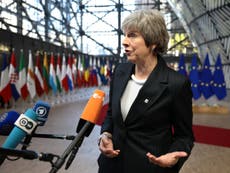This is how Labour MPs could end up saving Theresa May's Brexit deal
With so much opposition on her own benches, the most likely way to get a deal through the Commons is to secure a cross-party majority

Theresa May’s waning authority has taken another knock after she suffered an embarrassing rebuff at the EU summit in Brussels. To help her survive the confidence vote among Tory MPs on Wednesday, she promised to seek legally binding EU assurances that the proposed backstop to prevent a hard Irish border would be temporary and time-limited.
But that raised great expectations the EU was never going to meet. The summit has been a presentational disaster for a tense-looking May, who angrily confronted Jean-Claude Juncker, president of the European Commission, for telling the media she was “nebulous” in her demands. EU leaders dropped a proposal in their draft communique to offer her “further assurances”, perhaps fearing that real concessions now would only encourage Eurosceptic Tory MPs to demand more.
At a Brussels press conference this lunchtime, the prime minister insisted some progress had been made but conceded: “MPs will require further assurances.” She admitted to a “robust discussion” with Juncker – code for a row.
May’s problem was that frustrated EU leaders did not believe her optimism that, if they gave her a helping hand, her Brexit deal would secure a Commons majority when it is finally put to a vote in mid-January. They wanted a firm guarantee she could not give.
The EU’s predictable reaction will entrench the opposition to the deal among the 117 Tory MPs who voted to oust May in a confidence vote on Wednesday. May allies had hoped at least some of them would now “respect her mandate” and back her deal. But that won’t happen without game-changing concessions from the EU, which – as the summit shows – are very unlikely. Even her own cabinet ministers believe privately there is little hope of winning next month’s vote. Some will urge her to look at other options when the cabinet meets on Tuesday.
May will probably play for time (again). But sooner or later, she will have to find a plan B. With so much opposition on her own benches, the most likely way to get a deal through the Commons is to secure a cross-party majority.
The prime minister is tentatively reaching out. After her pyrrhic victory on Wednesday, she hoped to see “politicians on all sides coming together and acting in the national interest”. But it is not her natural instinct to be consensual – in her own party, let alone with MPs in rival ones. Cosying up to other parties would make it even less likely to get some of her Tory critics back on board. It’s not comfortable for any political leader to depend on the enemy; promises of support can turn into a parliamentary ambush. “She wants to rely on her own party,” one ally said.
At Labour’s conference in September, Jeremy Corbyn offered May a surprise olive branch, saying Labour would support a “sensible deal”, that Brexit was about “our vital interests” rather than “leadership squabbles or parliamentary posturing”. Yet May is right to be wary. Corbyn was always going to vote against whatever deal May secured, hoping a Commons rejection will result in a general election.
However, at some point, May will have to turn her attention to pro-European Labour backbenchers. Many fear a no-deal exit in March. Some represent areas which voted Leave in 2016 and so do not want to block Brexit.
Although Labour’s pro-EU wing will vote against May’s deal, some of its members might be tempted to back a plan B if it included a permanent customs union (Labour’s official policy) or a Norway-plus agreement inside the single market and a customs union.
There is a precedent. It took a rebellion by 69 pro-EU Labour MPs in 1971 to take the UK into the then European Economic Community (EEC). They rescued a Tory prime minister, Edward Heath, who faced defeat at the hands of his hardline Eurosceptics. Sound familiar?
Heath’s proposed entry terms faced rejection by a majority of 30, but 69 votes and 20 Labour abstentions gave him a surprisingly comfortable majority of 112. The Labour rebels included Roy Jenkins, the party’s deputy leader, who recalled in his memoirs that they felt able to defy their leadership’s three-line whip to oppose EEC entry because Heath gave Tory MPs a free vote. That is why some Tory MPs now urge that course on May now. Again, not her natural instinct.
Such collusion with other parties could create a permanent split in the Tory party.
May would give her right arm for 69 Labour votes and 20 abstentions; they might get a soft Brexit over the line. On paper, it’s not impossible, as 75 Labour MPs voted in favour of a Norway-style deal in June.
May’s problem is that opinion among this group is now moving in favour of a Final Say referendum. If Corbyn bowed to pressure from Labour’s grassroots members and backed a referendum, all but about 20 Labour MPs would vote for one.
Will the history of how we joined the EU repeat itself as we leave, with a Tory PM saved by Labour MPs? It looks unlikely. But with May in such a mess, there is a growing prospect that one episode from the past will be repeated. Four years later, in 1975, the UK held a referendum, and decided to stay in the EEC.



Join our commenting forum
Join thought-provoking conversations, follow other Independent readers and see their replies